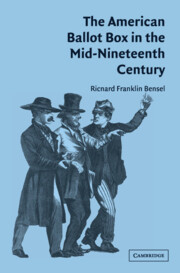Book contents
- Frontmatter
- Contents
- Preface
- Chapter 1 Introduction
- Chapter 2 Structure and Practice of Elections
- Chapter 3 Social Construction of Identity in Eastern Rural Communities
- Chapter 4 Ethno-Cultural Stereotypes and Voting in Large Cities
- Chapter 5 Frontier Democracy
- Chapter 6 Loyalty Oaths, Troops, and Elections during the Civil War
- Chapter 7 Conclusion
- Index
Chapter 1 - Introduction
Published online by Cambridge University Press: 10 November 2009
- Frontmatter
- Contents
- Preface
- Chapter 1 Introduction
- Chapter 2 Structure and Practice of Elections
- Chapter 3 Social Construction of Identity in Eastern Rural Communities
- Chapter 4 Ethno-Cultural Stereotypes and Voting in Large Cities
- Chapter 5 Frontier Democracy
- Chapter 6 Loyalty Oaths, Troops, and Elections during the Civil War
- Chapter 7 Conclusion
- Index
Summary
Broad economic interests clashed in national politics throughout the middle decades of the nineteenth century. These conflicts were mediated by local and national political institutions, particularly the party system and the federal allocation of power between the national and state governments. In terms of platform declarations and policy implementation, both the party system and government institutions more or less spoke the same language, executing a fairly transparent translation of economic interests into public policy. However, the logic and language of the great struggles dominating national politics were often garbled when transmitted into the electoral settings of the polling place. These settings were constructed out of material very different from that out of which the parties made policy in the state and national capitals. And they marshaled the attention and understandings of ordinary citizens whose concerns often were both different in quality and much more limited in scope. Many of the policy logics and disputes rending state legislatures and the federal Congress were simply beyond the event horizon of the individual voter.
Many elements entered into the construction of the local settings in which individual voters determined the fates of national parties. One of the most important was the sheer physicality of electoral practice, the arrangements through which citizen preferences were recognized and registered as official votes. Another was the social environment of the voter that determined how he aligned himself with others and thus distinguished between friend and foe. A third was the intermittent intrusion of national policy conflicts into the daily lives of citizens. For example, for many northerners, taxes and the draft were the most important ways that the Civil War materialized in their daily lives.
- Type
- Chapter
- Information
- Publisher: Cambridge University PressPrint publication year: 2004



